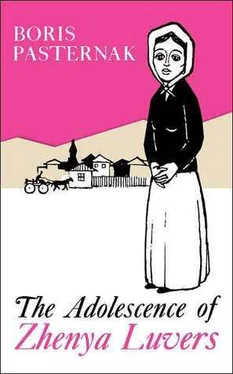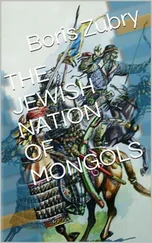On the evening Negarat told Mama he had to go to Dijon to do his military service, she was sitting, it so happened, at the table.
“Then, you must be very young,” their mother said and there was sympathy in her voice. He sat with drooping head, and the conversation came to a dead stop. “Tomorrow we put in the winter windows,” Mrs. Luvers went on, and asked Negarat whether she should shut the window. He said it wasn’t necessary, in his country there were no winter windows.
Their father came in soon afterward. He, too, offered expressions of regret when he heard the news. But before he uttered his laments, he asked in astonishment, “Dijon? Then you are not a Belgian?”
“Yes, I am a Belgian, but a French citizen.” And Negarat told the story of the emigration of his “two old folks” in such an interesting way, as if he were not their son, but with as much warmth as if he were reciting from a book about strangers.
“Excuse my interrupting you,” said their mother. “Zhenya, please shut the window. Vika, tomorrow the windows must be sealed. Now please continue. This uncle of yours was a real scoundrel. Did he literally say that under oath?”
“Yes.” And he resumed his story. Then he began talking about his own affairs—the papers he had received yesterday by mail from his consulate. He noticed that Zhenya failed to grasp what it was all about, but was trying hard to understand. Carefully, in order not to wound her pride, he began to explain in detail what military service was all about.
“Yes, yes, I understand. I do understand,” Zhenya repeated gratefully and mechanically. “But why must you go so far away? Can’t you become a soldier here, and drill where everybody else drills?” In her imagination she saw the drill meadows that could be seen from the monastery hill. “Yes, yes, I understand. Oh, yes,” she reassured him.
But the Luvers, who sat by, taking no part in this exchange, felt that the Belgian was simply stuffing the girl’s head with unnecessary detail and threw in lazy, oversimplified comments of their own. Then suddenly the moment came when Zhenya felt sorry for all those who, a long time ago or very recently, had been like Negarat, who had said good-by and taken an unknown route, which had been decreed by fate, in order to become soldiers here at Yekaterinburg, a completely strange place to them. The man had explained everything to her so well. Nobody had made it so clear to her before. The wall of indifference, the crumbling wall of concrete, fell away from before the picture of the white tents; the regiments disappeared and turned into a crowd of real people in soldiers’ uniforms, for whom she felt personally sorry the moment the new meaning given to them brought them to life, stripped them of their exotic glamour, and turned them into fellow creatures.
They said good-by to Negarat. “I am leaving part of my books with Tsvetkov. He is the friend I have told you so much about. Please keep reading them, Madame. Your son knows where I’ve been living; he often visits the landlord’s family. I will pass on my room to Tsvetkov. I will tell him to expect to hear from you.”
“He should come visit us sometime. Tsvetkov, did you say?”
“Yes, Tsvetkov.”
“He should certainly drop in. We’d like to meet him. I knew the family as a child….” And she noticed her husband standing before Negarat, his hands grasping the lapels of his tight-fitting coat and distractedly awaiting the moment when he could make final arrangements for tomorrow with the Belgian. “He should come, but not right away. I will let him know when. Now please take this book—it is yours. I haven’t finished it, but I cried over it, and the doctor advised me to stop reading altogether. To avoid excitement.” And again she glanced at her husband, who stood with his head down, collar crackling, cheeks inflated, as if investigating with great interest whether he really had shoes on both feet and whether they had been properly polished. “Yes, that’s how life is. Please don’t forget your walking stick. I do hope we’ll see each other again.”
“Of course, we shall. Friday. What day is it today?” Negarat became anxious, the way all those who leave become anxious.
“Wednesday. Is it not Wednesday, Vika? Yes, Wednesday.”
“Ecoutez.” Finally their father spoke. “Demain….” and taking Negarat’s arm, they walked downstairs together.
They talked as they walked along. Zhenya from time to time had to break into a light trot in order not to be left behind and to keep up with Seryozha. They walked very fast, her coat sliding back and forth, because she had her hands in her pockets and was steering herself with her arms in order to get up more speed. The thin ice broke with a crunch under their rubbers. They were going to buy a gift for Mama to give their departing friend. And they talked as they walked along.
“They took him to the railway station?”
“Yes.”
“But why did he sit in the straw?” “What do you mean?”
“In the cart. Up to his legs.”
“I told you already—because he is a prisoner, a criminal.”
“Are they taking him to jail?”
“No, to Perm. There is no criminal court here. Watch out for your feet.”
They had to cross the intersection, passing the workshop of a coppersmith. The workshop doors had stood open all summer and Zhenya was used to seeing the intersection in a state of friendly commotion, set off by the open jaws of the workshop. All through July, August and September carts stopped here for repairs and blocked the street. Peasants, mostly Tartars, stood around, buckets and pieces of broken, rusty gutter pipe strewn everywhere. The blazing, persecuting sun turned the crowd into a gypsy encampment and painted the Tartars with gypsy colors. It sank into the dust at about the hour when hens were killed behind the neighbors’ fences. The cart frames, freed from their animals, let their shafts with their greased plates drop into the dust.
The same buckets and the same scraps of metal still lay in confused disorder, now powdered with hoar frost. But the doors were tightly shut against the cold, as on a holiday. The intersection was empty, and only the familiar odor of stuffy gas, which flowed with a shrill screech from an air valve, reached Zhenya’s nostrils and clung to them as a cheap fruit wine clings to the palate.
“But is there a prison administration in Perm?”
“Yes, the criminal department…. I think we go this way…. The prison is in Perm because it is the provincial capital. Yekaterinburg is only a district capital—a hole.”
The narrow street led them past houses standing on their own plots of land; it was paved with red bricks and lined with bushes. Streaks of watery sunlight lay on the little street. Seryozha tried to stamp his feet as loudly as possible. “If you tickle this thorn bush in the spring, when it blossoms, its petals will go pop as if they were alive.”
“I know.”
“Are you ticklish?”
“Yes.”
“Then you must be nervous. The Akhmedianovs say that’s so if you’re ticklish.”
They walked on, Zhenya trotting, her coat swinging back and forth, Seryozha with his naturally long stride. They came upon Dikikh when they stopped at a small turnstile at the end of the narrow street. They saw him coming out of a shop half a block away. Dikikh was not alone. He was followed out of the shop by a little man who tried to conceal a limp as he walked. It seemed to Zhenya that she had seen him before. They passed each other without greeting, the other two moving off in a diagonal direction. Dikikh hadn’t noticed the children; he wore high rubbers and kept lifting his hands with fingers outstretched. He seemed not to agree with something his companion was saying and was trying to prove it with his ten fingers. Where had she seen the limping man? A long time ago. But where? Probably in Perm, in her childhood. “Stop!” Something was bothering Seryozha—he dropped to his knees. “Wait!”
Читать дальше










